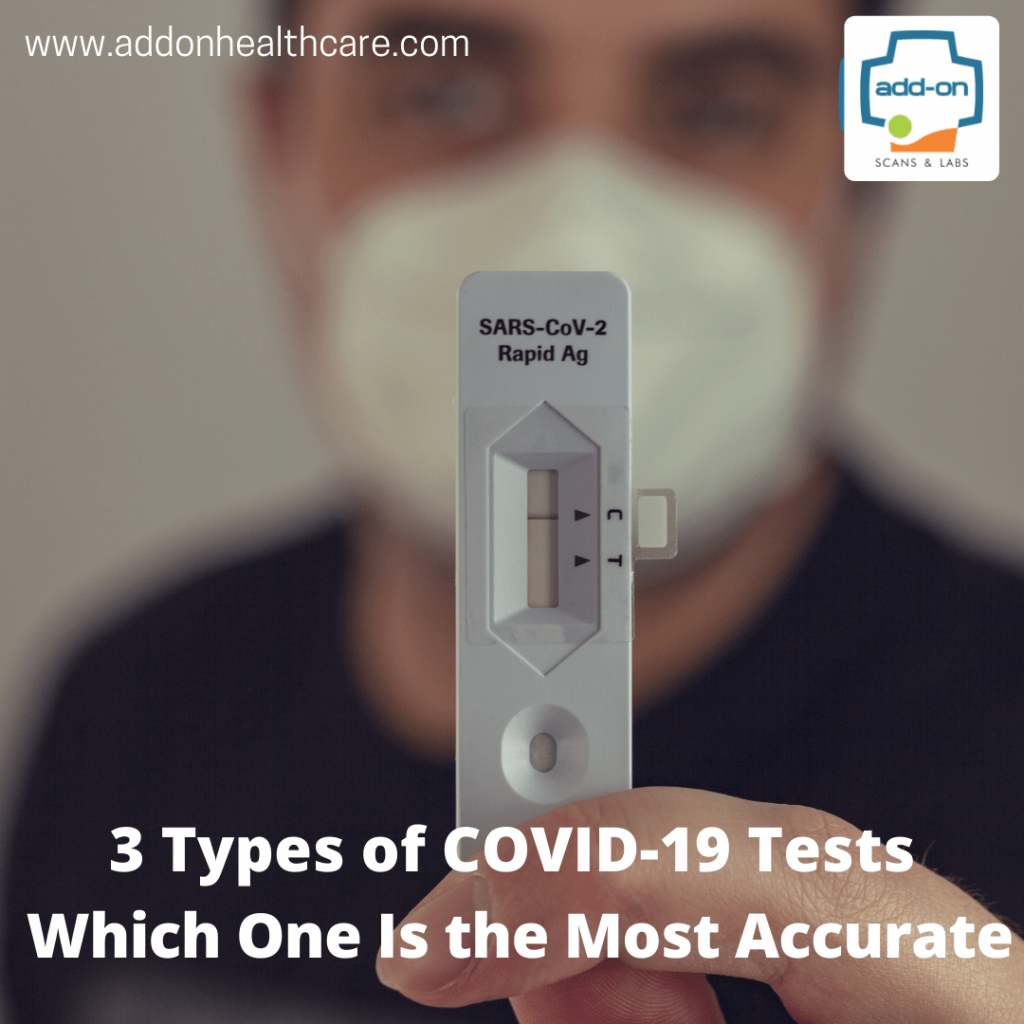COVID-19 TEST TYPES AND WHICH IS MORE ACCURATE
There have been many variations of COVID testing available, which have evolved over time as we learn about the virus and its effects on the Human body. This array of COVID-19 testing options that are offered by the government and health care facilities have different methods to test the virus – most of the tests are based on mucus and others on saliva or blood.
Given the number of options, how does one decide which test is right for you? Do all the tests work in the same way? Do they convey the same results?
To understand this, we start with the basics. As of today, there are two primary types of tests for COVID-19: diagnostic tests that look for active coronavirus infection in your mucus or saliva, and blood tests that hunt for antibodies—evidence that your immune system has encountered the infection before.
When your doctor orders a diagnostic test to confirm or rule out a coronavirus infection, the type of test and its results have important differences. According to experts, there are a couple of ways to detect SARS-CoV-2, the virus that causes COVID-19. Some tests look for a piece of the coating of the virus—they’re called antigen tests—and other tests detect nucleic acid (such as RNA) belonging to the coronavirus.
Getting the right COVID test
The right test, then, depends on the goal, such as confirming an active COVID infection; identifying asymptomatic or pre-symptomatic individuals who might be shedding virus, or determining whether someone previously had COVID.
Here’s what you should know about the different types of COVID tests, how they’re used, and what they can tell you.
Molecular test (aka RNA or PCR test)
These diagnostic tests are considered the most sensitive for detecting an active infection, and the results are highly accurate. You might take one if you or your doctor think you have COVID. You might also be asked to take this type of test if you need to prove to your employer that you are not currently infected prior to returning to work.
In most cases, a health care provider will collect mucus from your nose or throat using a specialized swab. (Some molecular tests now use saliva, which people may find more comfortable.) Molecular tests are often called PCR tests, short for a polymerase chain reaction, the lab technique used to detect the virus’s genetic material. Turnaround time varies from minutes to days or longer, depending on whether the sample is analyzed onsite or sent to an outside lab. Tests using a nasopharyngeal swab—the one that goes deep into your nose to the back of your throat—are still considered the gold standard.
Antigen test (aka rapid test)
This type of diagnostic test is often called a “rapid test” because the turnaround time is much quicker than an RNA test. It’s also cheaper to produce. As a result, antigen tests are being used to screen large numbers of people, like at airports.
From a patient’s point of view, antigen testing works in much the same way as molecular testing. Your health care provider will swab the back of your nose or throat to collect a sample for testing. But instead of waiting days for your results, an antigen test can produce a result in an hour or less. If you test positive, it’s probably correct: Antigen tests are highly accurate. The problem is, these tests are more likely to miss active infection. If you have COVID symptoms but test negative, your doctor may order a molecular test just to rule out a false negative.
Antibody test (aka serology test or blood test)
This test looks for antibodies to the coronavirus. Antibodies are proteins your immune system produces to fight off a foreign invader, such as a virus. A COVID-19 antibody test cannot diagnose active coronavirus infection. All it tells you is whether you’ve been infected at some point in the past, even if that occurred months ago. Antibodies do not become detectable until at least several days after an infection has started. You’ll have to see a health care professional, who will take a blood sample via a finger prick or a blood draw from a vein in your arm. The vast majority of these tests are performed at a central lab, which can take a couple of days to process.
Antibody testing isn’t recommended until at least 14 days after the start of symptoms. If you test too early—while your immune system is still mounting its defense—it may not provide an accurate result. Sometimes antibody testing is done along with viral testing when someone seeks care late in the course of their illness.
If you have noticed any symptoms such as cough, cold, throat ache and a low-grade fever, book a Home Sample Collection of COVID-19 test at add-on Scans and Labs. All our COVID test types are ICMR approved. If you are unsure about the type of test you need to take to detect COVID-19, you can tele-consult our doctor, who can prescribe the right test basis on your symptoms and consultation.
Call us or Whatsapp or book an appointment.

